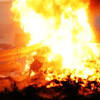The loneliness of the long-distance Yom Kippur faster

(JTA) — I am a sucker for extreme sports — or at least reading about them. My ideal Sunday afternoon includes a comfortable chair and a Netflix documentary or thick book about mountain climbers trying escape an avalanche or ultra-runners suffering during a 24-hour marathon.
Stories of people under extremis appeal to the 12-year-old boy in me, but I also read them hoping their authors’ suffering and triumphs will cough up some sort of wisdom about the human condition. What do they learn about their bodies when they push the limits? It’s the rare book by an adventurer or endurance athlete that doesn’t include a moment of satori, the Japanese Buddhist term for awakening or enlightenment — or at least a glimmer of self-knowledge. Writes the triathlete and mountain biker Terri Schneider: “Enduring is, in essence, a concentrated version of life placed under a bright microscope.”
Although I don't always find myself in a comfortable chair, the Yom Kippur fast is one of my most physically demanding activities. The endurance event is the 25-hour fast and synagogue Marathon. I hear echoes of the endurance athlete when rabbis describe the day as a test of “our willingness to submit to discipline” or “whether we are made of that same tough stuff that allowed Judaism to survive for thousands of years.”
As Yom Kippur approaches Tuesday night, one of the books on my nightstand is “The 12-Hour Walk,” a self-help book by the endurance athlete and adventurer Colin O’Brady. He has written about his own journey to become the first person to solo ski across Antarctica. He recommends that you take 12 hours to walk unplugged alone. You can go as fast as you like and as far as your heart desires. The physical test, the silence and the sense of accomplishment will leave you feeling you can overcome anything and “unlock your best life.”
“When I was crossing Antarctica alone in 2018 I was pulling my sled in silence for 12 hours per day. In the latter half of that crossing I felt deeply connected to mind, body, and spirit,”O’Brady told an interviewer. “Despite my body being worked, despite my ribs protruding, despite the frostbite on my face and limited food, I found this sort of flow state, this connection to purpose and fulfillment. I thought I could take that with me forever.”
A silent walk lasting 12 hours sounds very different from Yom Kippur's, which requires you to sit in a crowd and face a flood of words. The Day of Atonement is a similar experience to the one he describes. There is often, for example, the point in many adventurers’ memoirs when they talk about dying, or what they learned when they thought they were going to die. That too is a theme of Yom Kippur — if not actually pushing ourselves to our physical limits, it is a day, as Lew once explained, to “rehearse your own death. You don't eat, drink, or fornicate, and you wear a shroud. You summon the desperate strength of life’s last moments.”
The point of endurance sports is to summon that desperate strength. Joshua Kulp is a triathlete who is also the rosh yeshiva at the Conservative Yeshiva Jerusalem. He has written about his running within the context of Judaism. “When I was exhausted running the marathon, when all I wanted to do was join all of those walkers, I was somehow able to reach deep into my kishkes and go to places I’d never been,” he writes.
The Yom Kippur fast is, like many endurance tests about endurance, about what happens when one separates from everyday pleasures. Yom Kippur, writes Sue Levi Elwell in “The Sacred Table: Creating a Jewish Food Ethic,” “affords a unique opportunity for worshipers to stay for extended hours in synagogue and to distance themselves from socializing and food.” The 12-hour walk makes this “distancing” more than a metaphor, but similarly suggests enlightenment comes with the shock of separation.
Blessedly, in both cases such deprivation can be temporary and voluntary. Kulp points to the fact that the suffering that distance runners inflict upon themselves is in some cases a luxury for the fit and healthy. A grueling race offers “the opportunity to suffer without fear of loss,” he writes.
Even at a slow pace, a 12-hour walk sounds difficult enough. It sounds like torture to do it without listening or reading audiobooks or podcasts. But it won’t be fatal. I'm curious to see what I could learn if I pushed myself beyond my comfort zone. Yom Kippur certainly does that. Sometimes it leaves me feeling irritable and head-achey. Sometimes, I hear a prayer or read a passage that touches my heart and makes a difference in the way I treat others. And by sundown, and my first bite of bagel, I feel ready — for a little while anyway — to live my best life.



 United States
United States Argentina
Argentina  Australia
Australia  Austria
Austria  Brazil
Brazil  Canada
Canada  Chile
Chile  Czechia
Czechia  France
France  Germany
Germany  Greece
Greece  Italy
Italy  Mexico
Mexico  New Zealand
New Zealand  Nigeria
Nigeria  Norway
Norway  Poland
Poland  Portugal
Portugal  Sweden
Sweden  Switzerland
Switzerland  United Kingdom
United Kingdom 
























